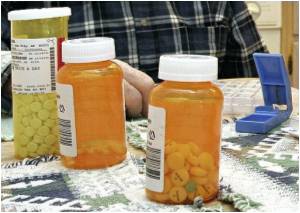Actos (pioglitazone)a pill that is used to treat adult onset diabetes, is also found to prevent the development of Type 2 diabetes in high-risk people.

An Actos (pioglitazone) pill taken each morning prevented the onset of Type 2 (adult) diabetes in 72 percent of the 602 high-risk participants in the study, whose findings were published in the New England Journal of Medicine.
Researchers also said they found among participants a 31 percent decrease in the rate of thickening of the carotid artery, a major vessel that supplies blood to the brain.
"It's a blockbuster study," said Ralph DeFronzo, professor of medicine at University of Texas at San Antonio, and principal author of the study.
"The 72 percent reduction is the largest decrease in the conversion rate of pre-diabetes to (Type 2) diabetes that has ever been demonstrated by any intervention, be it diet, exercise or medication," DeFronzo said.
Type 2 diabetes, if uncontrolled, can lead to serious medical problems including heart disease, kidney damage, amputation and blindness.
Advertisement
Takeda funded "an independent investigator grant" to DeFronzo to conduct the new study, during which some patients were tracked for up to four years. The average follow-up was 2.4 years, they said.
Advertisement
"The drug shows outstanding results," said study co-investigator Robert Henry, president of the medicine and science division of the American Diabetes Association.
"It is the most efficacious method we have studied to date to delay or prevent the onset of type 2 diabetes," added Henry, who is also a professor of medicine at the University of California, San Diego.
Robert Chilton, a University of Texas cardiologist who did not participate in the study, said the slowing of carotid artery thickness indicated that the participants' glucose was well controlled. That would help prevent blood vessel damage that leads to heart attacks, strokes and peripheral vascular disease, he said.
"The drug was able to postpone conversion to diabetes in 72 percent of people," Chilton said in the statement announcing the findings.
"The only thing that could potentially beat that is the free pill no one seems to be able to take -- diet and exercise."
Source-AFP















